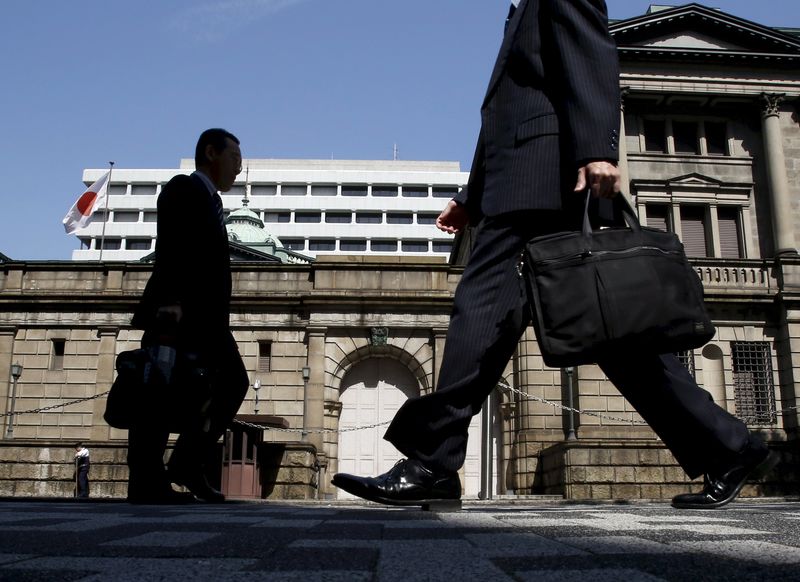By Kaori Kaneko and Sumanta Dey
TOKYO/BENGALURU (Reuters) - The Bank of Japan will ease monetary policy even further by July as a strong yen and still-sluggish economy threaten its ability to meet its ambitious inflation target, a Reuters poll showed.
Asked what steps it would take next, 80 percent of analysts surveyed May 11-17 picked a combination of cutting negative interest rates further and boosting its purchases of government bonds, exchange-traded funds and corporate bonds.
Japan's economy expanded at the fastest pace in a year in the first quarter, but analysts say the rebound was not strong enough to dispel concerns over the murky outlook.
The yen has strengthened about 10 percent against the U.S. dollar since the BOJ surprised markets in January by cutting its interest rate below zero, an unwanted outcome that could hurt the country's predominant export industries.
The Japanese currency firmed to just under 109 yen to the dollar on Wednesday, an exchange rate that a majority of economists said was too strong for the economy. Against that backdrop, expectations the BOJ will open its stimulus taps again remained high after it held policy steady in April.
Slightly more than half, 12 of 22 analysts, said the central bank would ease at its July policy meeting. Seven said June and the rest selected the Oct 31-Nov 1 meeting.
"The BOJ has not fully scrutinized the impact from negative interest rates to the economy and it also needs time to examine damages from earthquakes in Kyoshu Island," said Takumi Tsunoda, senior economist at Shinkin Central Bank.
"We expect more stimulus measures by the BOJ in July when it will release price and economic forecasts."
The BOJ, as part of the 'Abenomics' economic stimulus programme launched by Prime Minister Shinzo Abe more than three years ago, has pumped money into the economy, with the aim of pulling Japan out of decades of low inflation and the constant threat of recession.
But the BOJ's experiment with negative rates isn't catching on with analysts. They now expect the central bank to wait until the fourth quarter before chopping its -0.1 percent negative rate, compared with the third quarter in last month's poll.
BOJ Governor Haruhiko Kuroda said last week the central bank will act "decisively" to achieve its 2 percent inflation target, stressing that it still has "ample" policy options available if it were to expand stimulus again.
Stefan Grosse, economist at NORD/LB, who forecasts a BOJ move next month, says economic conditions now warrant it, pointing to weak domestic demand and the strong yen.
The yen firmed to a 1-1/2 year high of 105.55 yen
Asked what the best dollar/yen rate for the Japanese economy as a whole would be, five of 16 analysts said 110-114, another five said 115-119. Three selected 105-109, two said 120 or more and one said 100-104.
A separate Reuters poll of currency strategists found that dollar/yen at 100 was a red line for policymakers. [JPY/POLL]
"There is some probability of an FX market intervention," added NORD/LB's Grosse.
In the poll conducted before Wednesday's first quarter GDP release, there was no material improvement to economists' projections for growth or inflation, despite rising chances of the BOJ easing policy again.
Core consumer inflation, which includes oil products but excludes fresh food prices, will likely rise 0.2 percent this fiscal year, slightly down from the 0.3 percent projection made last month.
Next fiscal year, it is expected to average 1.8 percent, although almost half of it will likely come from the planned sales tax hike in April 2017.
Excluding the effects of that tax increase, economists forecast core inflation to rise 0.9 percent in fiscal year 2017.

The economy will likely expand 0.8 percent in the current fiscal year but the growth will likely be flat in fiscal 2017.